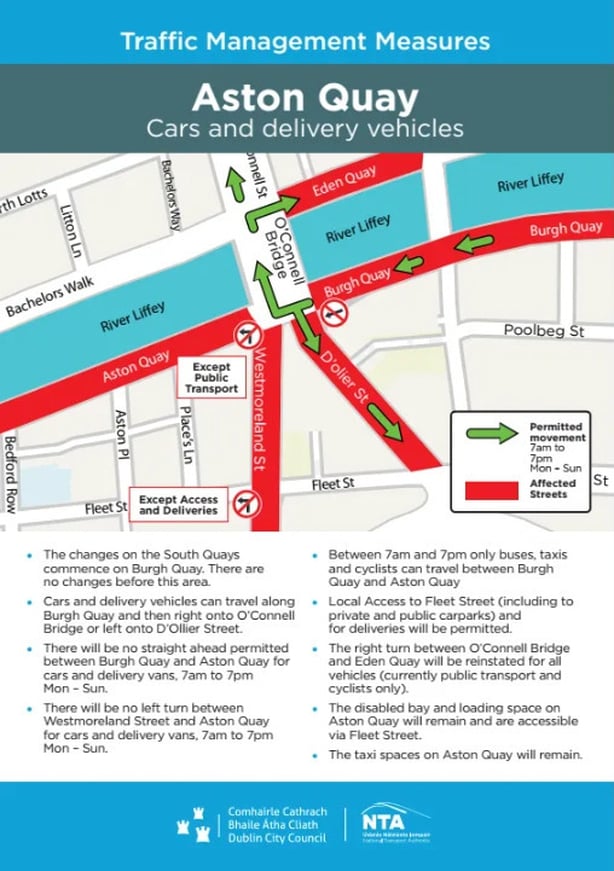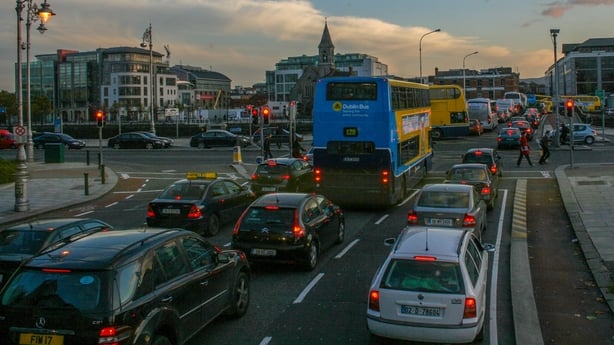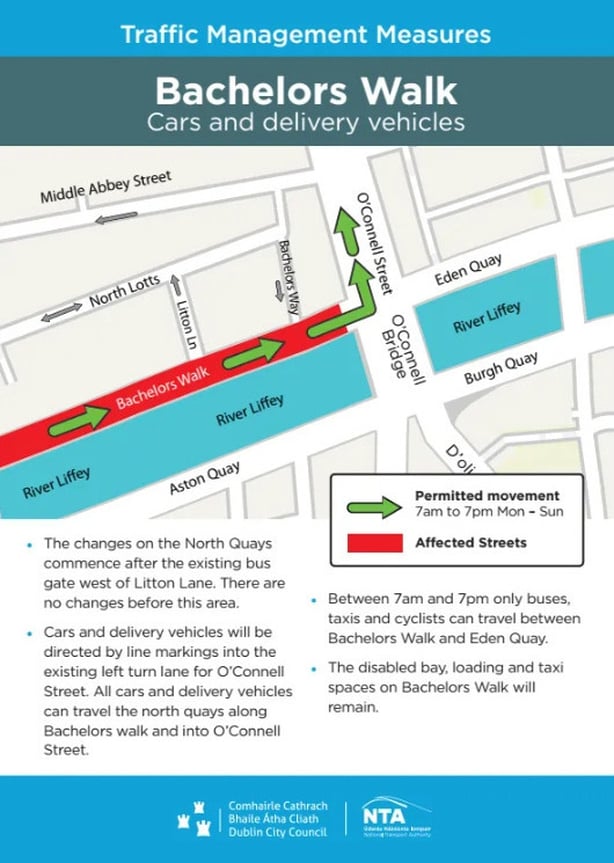The Dublin City Manager has said that he will proceed with plans to change the way private cars can travel through the capital next month.
However, the plans have been scaled back from what was originally outlined.
The first phase of the measures will come into effect from 25 August and will see a number of restrictions on private cars using the parts of the north and south quays between 7am and 7pm Monday to Sunday.
However, private cars will be able to travel across the Liffey bridges as before and all other routes on the quays and the city will remain the same.
The changes on the north quays at Bachelors Walk and on the South Quays on Burgh Quay and Aston Quay consist of road marking and signage changes that will restrict private car use.

He also said there will be no changes to the disabled bay, loading bays or taxi ranks, that the vast majority of routes to hospitals will remain the same, as will the majority of routes to city centre car parks.
Access for residents will also be maintained but he said there may be a different route to or from the area.
A working group will also be established to monitor the impact of the changes led by the Lord Mayor James Geoghegan and including business organisations, the National Transport Authority, councillors and other interested parties such as disability groups.

Dublin City Council Chief Executive Richard Shakespeare said that he had carefully considered the various views presented on the plan including the economic analysis presented the the Dublin City Traders' Alliance but he said he believed the correct course for the city was to proceed with the plan.

In recent months, the employers' group IBEC, the Dublin City Traders Alliance and Minister of State at the Department of Enterprise Emer Higgins all called for the plan to be paused because of concerns about the impact it could have on businesses in the city centre.
However, the Minister for Transport Eamon Ryan said the plan should be implemented and said if it was delayed Dublin City Council could lose funding.
Following calls for the plan to be paused until next spring, Mr Shakespeare said that he would consider an economic assessment carried out on behalf of the Traders Alliance, which is made up of Retail Excellence Ireland, Restaurants Association of Ireland, car park owners and retailers Brown Thomas and Arnotts.
That assessment claimed that more than €141 million will be lost in retail spending when the plan is fully in effect in 2028 and that more than 1,700 retail jobs in the city centre could be lost as a result, saying the plan could create a devastating and long-term impact on Dublin city trade.
Dublin City Council would like to announce that the first of the measures contained in the Dublin City Transport Plan 2023 will come into effect from 25th August 2024. For more details on the new measures please click here: https://t.co/Mj8xVoDVNc pic.twitter.com/DolOFgtDHs
— Dublin City Council (@DubCityCouncil) July 25, 2024
The Dublin City Traffic Plan, which was first published earlier this year, aimed to reduce through traffic in the city centre, which accounts for around 60% of motor journeys, using a number of measures including bus gates on the quays.
However, when Dublin City Council met earlier this month, amended plans were presented by the council to accommodate concerns raised by disability groups about access to the city by blue badge holders.
Some suggested these amendments amounted to a watering down of the original plans because it reduced the size of some proposed bus gates and the times that the restrictions would operate.
The majority of Dublin City councillors expressed their support for the original plan but its contents were noted by the council rather than voted on, as traffic management measures are by law decided by the council management and not elected representatives.
Under the plan, on the north quays private cars will no longer be permitted to travel from Bachelors Walk to Eden Quay during the bus gate operating hours.
On the south quays, private cars will also be prevented from driving from Burgh Quay to Aston Quay during these times.
Brendan O'Brien, Head of Technical Services at Dublin City Council, said the changes would help improve the capital.
He said: "This is an opportunity for the city. It's a way the city can grow and it's a way that we can really start to embrace the city.
"And if that means that what we are doing at the start is a little less restrictive than originally planned and it's easier to start to get those measures in, then I think it's worth doing."
Green Party Councillor Claire Byrne said she was happy the plan was proceeding, albeit with changes.
"There have been some concessions made and I think it was disappointing that there was last-minute interventions and some wavering on the timelines," she said.
"But overall, I think it's really great the city manager has held fast and that he's going to proceed next month," she added.
The Lord Mayor of Dublin welcomed the introduction of a group to monitor the impact of the traffic changes.
"I welcome the fact that a group involving all stakeholders will now be established, which I will chair, to monitor the impact of the new measures on the city," Mr Geoghegan said.
"We do need to change how we engage with the public and traders in relation to traffic measures and this is a step in the right direction," he added.
The Dublin City Centre Traders Alliance say they are disappointed by the decision and that they are currently considering their position.
In a statement the group said city centre businesses have "grave and serious concerns" about the plan.
The group said: "Our Alliance has made every effort to communicate the anticipated deleterious effects of this plan on Dublin City to Dublin City Council which have amounted to nothing.
"Dublin City Council's recommendation of this evening for the formation of a working group after the plan has been implemented arguably undermines the efficacy of that group.
"We must now speak with all of our members and consider our position in the face of today’s decision."
Professor Brian Caulfield of Trinity College Dublin's School of Engineering said that an "incremental approach" to traffic plan changes is "sensible".
He said that international examples show that "when a city goes ahead with a 'Big Bang’ introduction of a large number of traffic changes they can ultimately result in chaos".
Mr Caulfield said that "an important job for the working group is to monitor success and make recommendations upon changes to the system".
"It is good to see the Dublin City Council is pressing ahead with some of the main elements of the original plan," he added.






